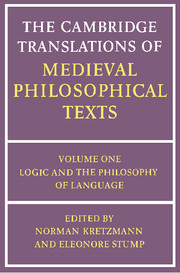Book contents
- Frontmatter
- Contents
- Preface
- General Introduction
- 1 BOETHIUS: On Division
- 2 Anonymous: Abbreviatio Montana
- 3 PETER OF SPAIN Predicables Categories
- 4 LAMBERT OF AUXERRE: Properties of Terms
- 5 Anonymous: Syncategoremata Monacensia
- 6 NICHOLAS OF PARIS: Syncategoremata (selections)
- 7 PETER OF SPAIN: Syllogisms; Topics; Fallacies (selections)
- 8 ROBERT KILWARDBY: The Nature of Logic; Dialectic and Demonstration
- 9 WALTER BURLEY: Consequences
- 10 WILLIAM OCKHAM: Modal Consequences
- 11 ALBERT OF SAXONY: Insolubles
- 12 WALTER BURLEY: Obligations (selections)
- 13 WILLIAM HEYTESBURY: The Compounded and Divided Senses
- 14 WILLIAM HEYTESBURY: The Verbs ‘Know’ and ‘Doubt’
- 15 BOETHIUS OF DACIA: The Sophisma ‘Every Man is of Necessity an Animal’
- Index
14 - WILLIAM HEYTESBURY: The Verbs ‘Know’ and ‘Doubt’
Published online by Cambridge University Press: 05 June 2012
- Frontmatter
- Contents
- Preface
- General Introduction
- 1 BOETHIUS: On Division
- 2 Anonymous: Abbreviatio Montana
- 3 PETER OF SPAIN Predicables Categories
- 4 LAMBERT OF AUXERRE: Properties of Terms
- 5 Anonymous: Syncategoremata Monacensia
- 6 NICHOLAS OF PARIS: Syncategoremata (selections)
- 7 PETER OF SPAIN: Syllogisms; Topics; Fallacies (selections)
- 8 ROBERT KILWARDBY: The Nature of Logic; Dialectic and Demonstration
- 9 WALTER BURLEY: Consequences
- 10 WILLIAM OCKHAM: Modal Consequences
- 11 ALBERT OF SAXONY: Insolubles
- 12 WALTER BURLEY: Obligations (selections)
- 13 WILLIAM HEYTESBURY: The Compounded and Divided Senses
- 14 WILLIAM HEYTESBURY: The Verbs ‘Know’ and ‘Doubt’
- 15 BOETHIUS OF DACIA: The Sophisma ‘Every Man is of Necessity an Animal’
- Index
Summary
Introduction
For information on Heytesbury's life and writings, see the introduction to Translation 13. The selection translated here is the second chapter, De scire et dubitare, of his Rules for Solving Sophismata.
Sophismata are puzzling propositions that, when interpreted on special hypotheses, appear to be supported by one set of arguments and opposed by another set, thus generating a paradox. Heytesbury's Rules is intended as a handbook for students, to sharpen their skills at dealing with the sorts of sophismata then being debated in the schools. Chapter I deals with insolubilia, or variations on the liar's paradox. Chapter II considers the logical and semantic effects of the verbs ‘know’ and ‘doubt.’ Chapter III deals with propositions involving relative terms, and the puzzles discussed involve the kind of reference (mode of supposition) of the relative term used in various ways in several sorts of propositions. Chapter IV considers propositions involving the verbs ‘begin’ and ‘cease,’ which generate puzzles about time and change. Chapter V, on maxima and minima, concentrates on the problems of setting limits to certain quantitative or qualitative continua, such as weight or heat. Finally, Chapter VI, on the three categories of place, quantity, and quality, is concerned with velocity and acceleration.
Chapter II, translated here, has to do with sophismata that generate paradoxes about knowing and doubting and may fairly be said to belong to what would now be called epistemic logic.
- Type
- Chapter
- Information
- The Cambridge Translations of Medieval Philosophical Texts , pp. 435 - 479Publisher: Cambridge University PressPrint publication year: 1989

